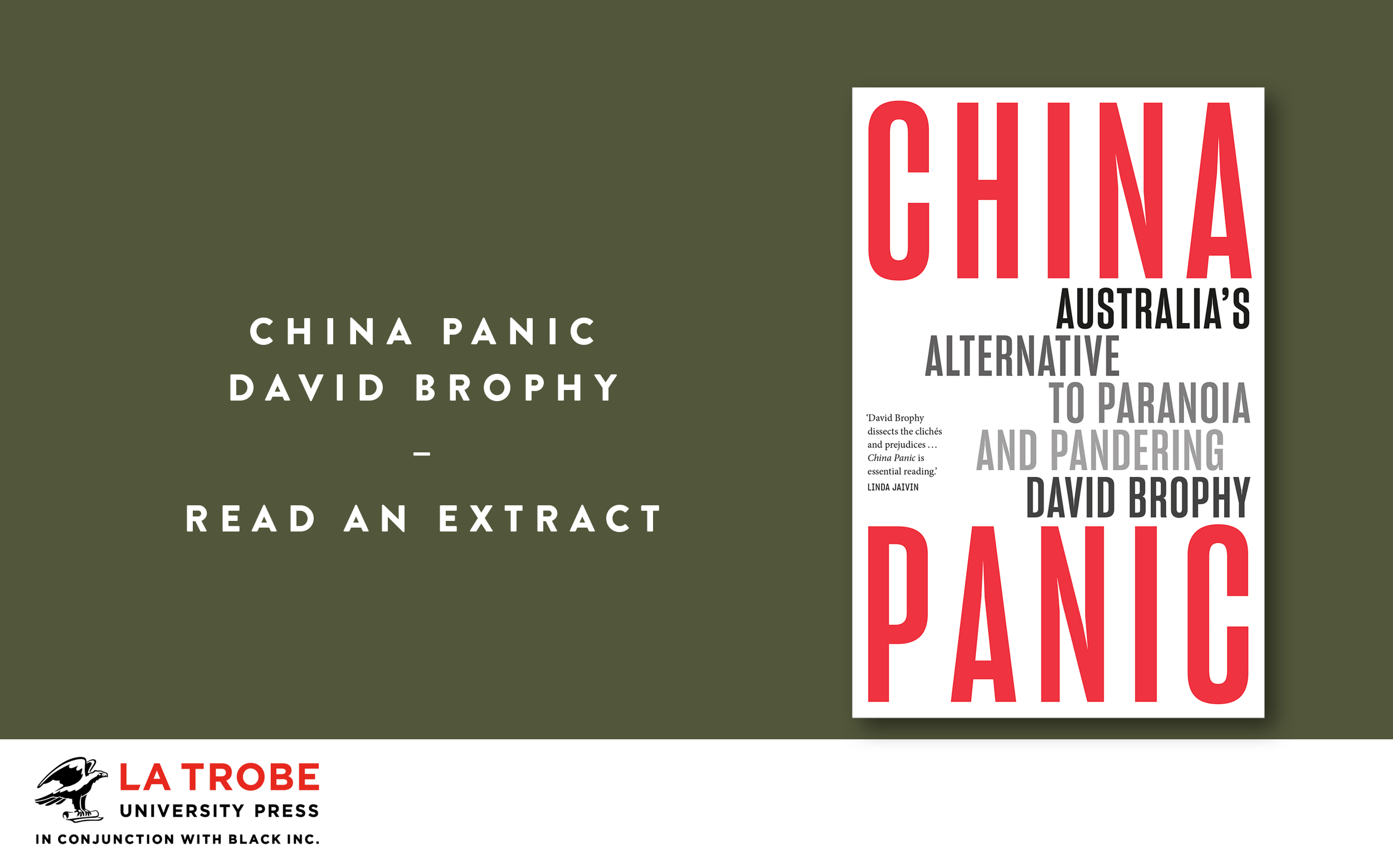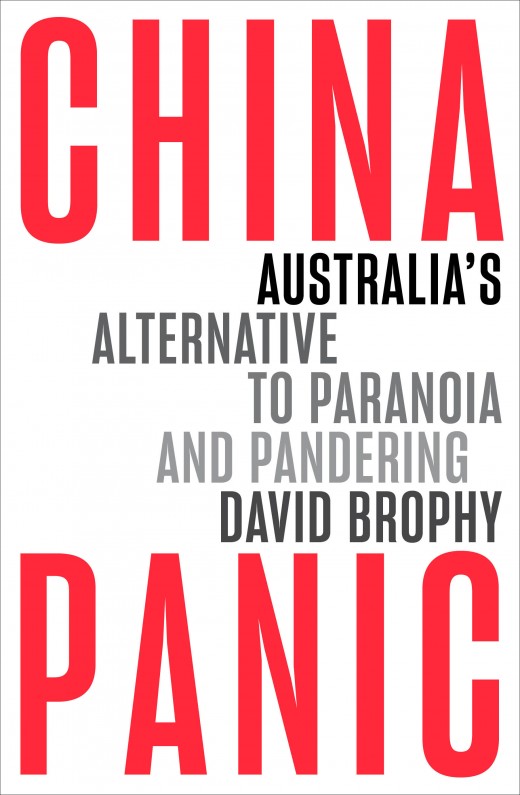News

News >
Read an extract: China Panic
A better way to think about foreign influence and the nation’s future. Read an extract from China Panic.
This book is both a critique of Australia’s China policy and a critique of what the politics surrounding China is doing to Australia. It’s not a book about how we need to return to a traditional ‘engagement’ stance or how anti-China politics is ruining Australia’s trade surplus. Getting back into China’s good books is not my interest. While I’m not blasé about the impact that the end of the China trade might have on Australian livelihoods, there are more important things to consider than simple economic imperatives. Yet by the same token, I don’t share the convition that incurring the wrath of Beijing is in and of itself the hallmark of good policy.
My basic motivations for writing this book are quite straightforward: I see as dangerous any efforts to uphold a flagging American hegemony in Asia, which is now of an almost exclusively military nature. I worry at the visible rise in anti-Chinese racism we see here. And I worry at the worsening levels of state repression in China. The fate of the Uyghurs, the future of civil liberties and democracy in Hong Kong – these are things we should all be worried about. Indeed, I’d go so far as to say they should be the top priorities for any Australians dealing with China. But the seriousness of these situations requires equally serious reflection on how best to engage with them. I don’t believe we advance the cause of human freedom in China by lining up with its enemies here in Australia, or by driving away ordinary Chinese Australians with Sinophobia.
I’m sure a lot of people would agree with this as a starting point. This book is written, though, with an understanding that foreign policy is not so much a field of competing ideas as a field of competing interests. As much as Australia’s major parties are resolute in their loyalties to the US alliance, they also remain deeply beholden to corporate interests. In a field of foreign policy dominated by these two outsized influences, it can often feel as if our options are constrained. China hawks don’t so much challenge the corporate influence on Australian policy as use it as a foil: if we don’t side with the United States, they ask, then what’s to stop Australia dropping its criticism of China for the sake of a buck?
I take this question seriously. Certainly, nobody wants corporate lobbyists writing Australia’s China policy. Even if that’s not on the cards, certain truths have been exposed about the nature of Australia’s transactional relationship with China, and about China itself, that naturally make people hesitant to endorse any return to ‘business as usual’. The standard critique of ‘engagement’ – that the West learnt to live with a repressive party-state so as to advance its own political and economic interests – has much truth to it. Compromises that were made to preserve and cultivate ‘the relationship’; a revolving door between politics and the corporate world; the blurry line between political lobbying and more dubious forms of influence-peddling: all of these issues and more have come into view. Certain things that were unsayable (or if said, were ignored) have now become sayable. But they’ve become sayable in a particular way – a way that draws the focus away from any systemic critique and keeps it fixed on China. This is the point where I dissent.
A catalogue of the various accusations levelled at China and its activities in Australia has already filled one book. Reviewing and evaluating the accuracy of these various claims could easily fill a second. This is part of what I do here. But the more important task is to engage with the framing of Australia’s China panic. Beyond the news cycle and the day-to-day policy debate, Australia’s ‘China choice’, as I see it, is about the lens through which we view China’s place and role in the world.
Is there something uniquely corrosive about Chinese influence, for example, or do episodes of political corruption involving China reflect flaws in Australia’s political system? Is the PRC a uniquely dangerous actor in world affairs, or should we interpret its actions in light of a global system of which it is a part? Even at the level of China’s domestic policies, we can ask similar questions: is China’s persecution of its Muslim minorities of its own making, or is it tied to wider international trends?
In an intellectual sense, of course, everyone will admit to the need for a degree of self-criticism. But in practice, Australian policies have consistently singled out China at the expense of any wider critique. On a range of issues, it’s hard to make sense of Australia’s stance without coming to terms with the fact that China is already being thought of as an enemy state. This sense of mission gives the hawkish stance a certain coherence, moral force even, that elite criticism of it sometimes lacks. But it ends up undermining the very values that it invokes for its justification.
Criticism, for it to count as criticism, has to be made on the basis of certain standards against which we measure everyone – including ourselves. If we’re not doing that, then we’re doing something else. If we’re more for- giving of bullying diplomacy when America’s interests are at stake, rather than China’s, then we’re simply not a credible critic of bullying diplomacy. What’s more, when the emphasis is put on the Chineseness of an actor, and not the nature of the action itself, associations with China in and of themselves quickly become stigmatised. A national-security lens extends across all sorts of diasporic ties to China that until very recently were thought to be harmless, even positive. Any and all such associations, indeed the very presence of Chinese in Australia, are seen to have security implications. Far from defending the rights that Chinese Australians value here, the response to China puts these rights at risk.
If business-led engagement with China is an unlikely vehicle for the promotion of democracy and human rights, then so too is the new paradigm of strategic competition. Australia has hit upon a response to China that is not only unconvincing for its inconsistencies. With its heavy reliance on security measures, the increasing use of inscrutable ‘national interest’ determinations, and an implicit, and sometimes explicit, view of PRC citizens as a fifth column, this new paradigm is undermining democratic rights and rule of law in a way that only legitimises China’s desire to do the same thing.
The solution seems obvious. What we need is a position not beholden to the paranoid vision of the security agencies or to the priorities of trade, but one that lives up to its profession of universal values. This, of course, is where the structural constraints of foreign policy get in the way. To reorient Australia’s China politics in a more progressive direction, one capable of both defusing the brewing cold-war conflict and extending solidarity to people in China, there’s no getting around the fact that those constraints will need to be broken down and a wider range of voices and interests represented in the making of Australian foreign policy.
This is not a perspective that I imagine many members of the major parties, or the foreign policy establishment, will embrace. I’d be delighted if they did, but this book isn’t written for them. I sometimes talk about what ‘Australia’ should do, but most of the time I’m really talking about what Australians should do. I’m sceptical that the Australian state, as it exists today, can be a principled humanitarian actor on the world stage – it’s simply not built for that purpose. Similarly, with occasional exceptions, I avoid referring to a national ‘we’. The lesson to draw from today’s conflict over China policy is not that Australia is having trouble identifying its national interest, but that there’s really no such thing as a single national interest. Global rivalries for economic and political dominance serve elite interests, but for the rest of us, they deplete public resources and endanger political freedoms. To get out of the rut into which Australia’s China debate has settled, we need to recentre it on the interests that ordinary people in Australia and across Asia share in both combating oppression and resisting warmongering.
The array of questions that China raises for Australia today is daunting, far too diverse for anyone to claim expertise in them all. I’ve written this book not because these questions require a specialist, but because they’re too important to leave to the specialists. Although the study of China is my full-time job, what I’ve written here is as much a reflection of my recent experience as a participant in debate, and as an activist, as it is a reflection of my academic pursuits. It’s as much an exercise in Australia-watching as it is in China-watching, and Australia-watching is something that everyone who lives in this country should be doing.
China Panic by David Brophy is out now.
Share this post
About the author
David Brophy is a historian of Uyghur nationalism and the author of Uyghur Nation. He is a frequent commentator on the Xinjiang crisis and a senior lecturer on modern Chinese history at the University of Sydney.
More about David Brophy




